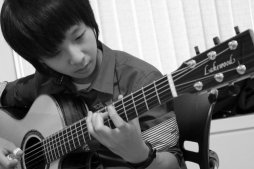“The important thing is not to stop questioning. Curiosity has its own reason for existing. One cannot help but be in awe when he contemplates the mysteries of eternity, of life, of the marvelous structure of reality. It is enough if one tries merely to comprehend a little of this mystery every day. Never lose a holy curiosity.” ~Albert Einstein
Real and meaningful learning is a creative process. Skills and knowledge cannot be downloaded like computer software, they must be acquired, constructed and mastered– through long-term application and effort.
Those who have studied successful skill mastery describe a common process that is followed, one that requires practice, effort, patience, experimentation and deep concentration. This is as true for basketball, chemistry and guitar playing as it is for cooking, painting, karate, engineering, parenting and brain surgery.
Take the example of language learning. All children are born with the natural ability to learn new languages, they have brains that we might compare to language learning “hardware” in a computer. Over time they master the language of those who surround them, what we might compare to software. But this is where the similarity between computers and humans ends.
 With a computer you simply transfer the data from one location to another. With human beings new knowledge must be practiced and applied in meaningful situations, so that lasting comprehension and skills develop. Like the body taking in raw materials and transforming them into muscles and bones there is a very organic and constructive process that happens in our brains. Our minds are designed to learn that way (see: Understanding How Our Brains Learn).
With a computer you simply transfer the data from one location to another. With human beings new knowledge must be practiced and applied in meaningful situations, so that lasting comprehension and skills develop. Like the body taking in raw materials and transforming them into muscles and bones there is a very organic and constructive process that happens in our brains. Our minds are designed to learn that way (see: Understanding How Our Brains Learn).
This is why force-feeding decontextualized “knowledge” and then measuring retention with standardized tests is a dead end approach to education. While a computer can retain information that doesn’t mean it understands how to use it.
Tests that focus on memorization of data or a narrow range of skills do not measure deep comprehension and mastery. They also fail to assess social and emotional competence, as well as other “soft” skills which are absolutely essential for career and life success.
 Human beings are not empty containers or machines into which information can just be downloaded in one direction. Practical skills and abilities only develop when learning is interactive, creative and dynamic. Knowledge has to be applied directly and used creatively in meaningful situations.
Human beings are not empty containers or machines into which information can just be downloaded in one direction. Practical skills and abilities only develop when learning is interactive, creative and dynamic. Knowledge has to be applied directly and used creatively in meaningful situations.
Maria Montessori pointed this out decades ago, as have modern researchers and educators such as Mihaly Csikszentmihalyi, Ken Robinson, Carol Dweck and Howard Gardner. There is no way to bypass the natural skill development and mastery process, because humans are living beings, not robots.
Children understand this, intuitively. During the first years of their lives they learn quickly and informally- mastering their parent’s language, discovering how to communicate, explore, walk, run, sing, paint and dance.
In the early years learning is a source of great joy for children, they explore their surroundings playfully, with confidence, curiosity and excitement. They are intrinsically motivated to understand the world, build skills and discover new things.
 They are not afraid of failing and making mistakes because they don’t measure or compare themselves to others. They know that nothing can be mastered without trial and error. It is for this reason that wise parents and educators place more value on mastery-oriented character traits, curiosity, interest and positive attitudes toward learning than on assessments and test scores.
They are not afraid of failing and making mistakes because they don’t measure or compare themselves to others. They know that nothing can be mastered without trial and error. It is for this reason that wise parents and educators place more value on mastery-oriented character traits, curiosity, interest and positive attitudes toward learning than on assessments and test scores.
A child equipped with patience, perseverance, curiosity and self confidence is best prepared to learn new things and overcome obstacles in life. They understand why practice and re-learning is so important, why they need to continuously update their understandings, cooperate with others and learn from those who have greater skills and wisdom.
If guided wisely, they will come to realize that there are no short cuts to “achievement,” and that test scores alone are meaningless if they are unrelated to essential soft skills, creativity, love of learning and depth of understanding.
~ Christopher Chase
The Art of Learning

Pingback: Real Learning is a Creative Process – Heart of the Art
Pingback: Real Learning is a Creative Process | Thinking ...
Pingback: The Joy of Learning | Creative by Nature
Reblogged this on andrewpaulkleinblog and commented:
“The important thing is not to stop questioning. Curiosity has its own reason for existing. One cannot help but be in awe when he contemplates the mysteries of eternity, of life, of the marvelous structure of reality. It is enough if one tries merely to comprehend a little of this mystery every day. Never lose a holy curiosity.” ~Albert Einstein
Pingback: Education of the Spirit | Creative by Nature
Pingback: 24 Human Character Strengths and Core Virtues | The Agile Note
Pingback: How We Learn to Compartmentalize | Creative by Nature
Pingback: The Future of Education: To Focus on AI or MI ? | Creative by Nature